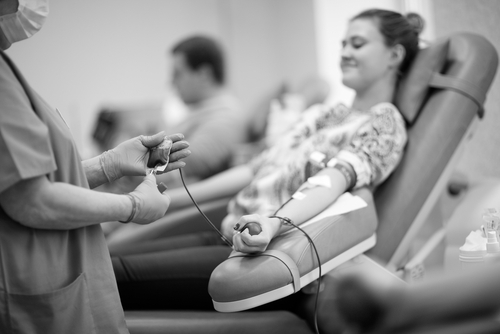Blood donation reduces cancer risk, balances iron levels in blood: Expert
UNI Jun 14, 2018
Donating blood frequently not only saves human lives, but also reduces the risk of cancers and balances iron levels in the body of donors, said K Hitesh Kumar, Transfusion Medicine Consultant at KIMS Hospitals, Hyderabad.

Every two seconds, someone in India needs blood and every day, roughly 36,000 units of red blood cells are needed in the country, Dr Kumar said in a statement on the occasion of World Blood Donor Day, celebrated on June 14. Patients with sickle cell diseases or cancer need blood transfusions throughout their treatments, while a single car accident victim can require up to 100 pints of blood. Since blood can't be made or manufactured, these patients depend on blood donors for their very lives, he said.
When a person donates blood, he saves up to three human lives each time, Dr Kumar noted. Explaining the benefits of blood donation, the medico said theoretically, donating blood frequently reduces the risk of cancers as it lowers the high levels of iron, which have been implicated in cancer.
Peripheral artery disease patients, who regularly donate blood, have a lower risk of developing cancer than those who don't, as per a study published by the Journal of National Cancer Institute. Donating blood at least once a year can reduce the risk of heart attack by 88 per cent, according to a study conducted by the American Journal of Epidemiology, said Dr Kumar, adding that high levels of iron in blood vessels increase the risk of heart attack.
Blood donation also keeps liver healthy by reducing the incidences of non-alcoholic fatty liver disease and other liver diseases. It also produces new blood cells in the body, he said. One time blood donation helps to shed 650 Kcal, which can aid in weight loss, he stated, adding that regular blood donation can help in keeping the levels of iron in the body in check, especially in males.
Though iron is an essential element for proper functioning of the body, excessive iron build up can result in excessive oxidative damage, a major culprit implicated in accelerating ageing, heart attacks and strokes, as published by the American Journal of Epidemiology, he added.
-
Exclusive Write-ups & Webinars by KOLs
-
Daily Quiz by specialty
-
Paid Market Research Surveys
-
Case discussions, News & Journals' summaries